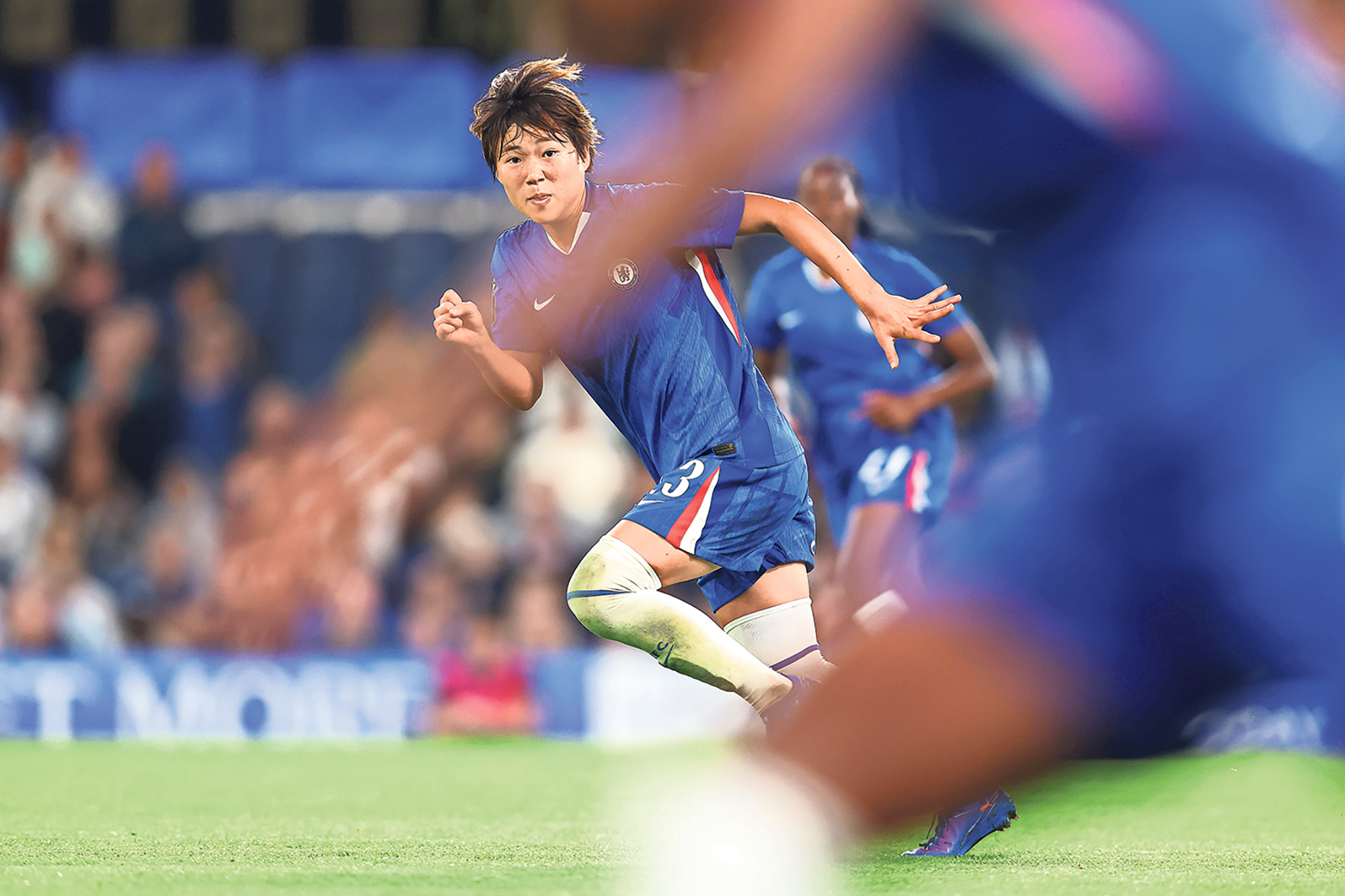Sam Kerr’s warm-up had amounted to not very much more than a gentle jog down the Stamford Bridge touchline before she realised the exercise was futile. She had been waiting for this moment for the better part of two years, ever since tearing her anterior cruciate ligament during a training camp in January 2024. Judging by the ripple of warm applause that greeted her appearance, so had plenty of others.
They would, in the event, get no more than a glimpse. Chelsea were holding on to a narrow lead against a spirited Manchester City team in the curtain-raiser to the Women’s Super League season. Sonia Bompastor had one substitution window left. Her assistant, Théo Rivrin, caught Kerr’s eye. And instructed her to tell Sjoeke Nüsken, the German international, that she was coming on to shut the game down.
Not quite able to hide her disappointment, Kerr – once not just the world’s most fearsome striker but formerly its best-paid female player, too – trudged back to her seat. Alongside her was another unused substitute, the vastly experienced Norwegian international Guro Reiten. Bompastor’s thinking, of course, was purely tactical. It was just a happy accident that it was also quite the flex.
It is just a few months since Bompastor, fresh from beating Manchester United in the FA Cup final to complete a domestic treble in her first season in England, encouraged Chelsea’s rivals to continue investing, to raise the bar, to push her team as hard as they could. “Come with us,” she urged them. Only with competition, she said, would Chelsea be able to “produce our best”.
Over the course of the summer, the rest of the WSL have done their best to rise to Bompastor’s challenge. Although figures from Fifa suggest the clubs of the NWSL, the United States’ domestic women’s league, have spent more money than anyone else in the last couple of months, England’s teams have done their best to keep pace.
Arsenal, already the reigning European champions, broke the world transfer record to sign the Canadian forward Olivia Smith from Liverpool for £1.1m. London City Lionesses, newly promoted and pulsing with ambition, paid £1.4m to entice Grace Geyoro, the France midfielder, from Paris Saint-Germain earlier this week. It was quite the statement of intent, not least because Chelsea themselves have tried on several occasions in recent years to prise the 28-year-old from the French capital.
City, meanwhile, have added –among others – Grace Clinton and the German midfielder Sydney Lohmann to a squad that already includes not just a detachment of England internationals but Vivianne Miedema and Mary Fowler; Manchester United persuaded Jess Park to move across the city and enticed Fridolina Rolfö from Barcelona. The level of spending has made it hard to argue with the assertion that the WSL is “probably the strongest league in the world right now”.
Chelsea, by contrast, had been relatively quiet. Bompastor had brought in Mara Alber, a promising German forward, and Livia Peng, the impressive Swiss goalkeeper, more as cover than competition for Hannah Hampton. Until the last breaths of the transfer window, Ellie Carpenter, the adventurous Australian full-back, was the only likely starter Chelsea had signed.
That all changed when the club finally managed to close a deal with Angel City to sign Alyssa Thompson, the US forward, as the deadline approached. She was unveiled to Stamford Bridge with a blast of a smoke machine on Friday evening; Chelsea had been working on her arrival, Bompastor revealed, for much of the summer.
Thompson’s calibre is not in question. She was a first-round draft pick for Angel City just two years ago; she scored her first goal for the club while she was still in high school. She had played for her country before she had played professionally. She has, for some time, been regarded as the United States’ next big thing.
Newsletters
Choose the newsletters you want to receive
View more
For information about how The Observer protects your data, read our Privacy Policy
It is testament to Chelsea’s strength, then, that she faces considerable competition for a place. That Bompastor could afford to overlook both Kerr and Reiten was not the only indication of the club’s extraordinary resources on offer on Friday.
Before the game started, all six of Chelsea’s Lionesses were presented to the crowd, alongside Manchester City’s contingent. Lucy Bronze strode on to the field clutching the European Championship trophy in her left hand. She was in her civvies, still recovering from the injury that she did all she could to ignore during England’s glorious summer. Lauren James, too, was a spectator.
Watching on was Naomi Girma, the American defender who was – until this summer – the most expensive player in English history. Mayra Ramírez, the Colombian forward signed to replace Kerr during her absence, and Kadeisha Buchanan are nursing long-term injuries, but they should both return at some point this season.
Even among the riches of the WSL, the effect of Chelsea’s strength in depth borders on overpowering; it is hard not to feel a faint Galáctica air around Bompastor’s squad. This is a team, after all, that not only completed a clean sweep of domestic trophies last season, but did not suffer a single defeat over the entire WSL campaign. (City were, in fact, the only domestic side to beat them over 90 minutes, in the first leg of the Champions League quarter-finals; Chelsea duly beat them in the return.)
The arrival of Thompson and the return of Kerr – delayed as it may have been – only serves to make them look stronger. It is hard, even one game in, to see how anyone can touch them; City, for all their endeavour, ultimately fell some way short. On reflection, Bompastor may not have been urging their rivals to try to push them after the FA Cup final. She might, instead, have been daring them to keep up.
Photo by Charlotte Wilson/Offside via Getty Images



